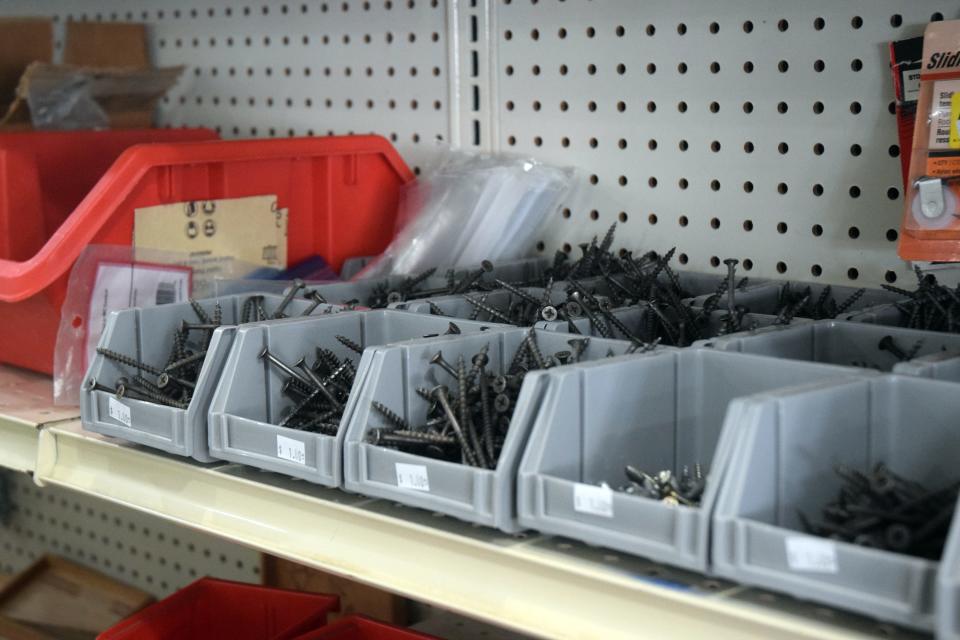Getting the urge to purge? Here's how to spring clean responsibly
The warm months are just around the corner, and many are beginning to feel the annual urge to clean out their homes and start fresh. After months spent inside, a round of spring cleaning can help push away seasonal affective disorder and prepare us for the warmer months.
A study conducted in the United Kingdom in 2021 found that, as housing becomes smaller and boosted production makes items cheaper and more accessible, clutter is becoming an issue — and it's taking a toll on mental health.
The act of decluttering itself, and cleaning that comes with it, can also negatively affect the environment.

According to Lindsey Walker, head of market development and commercial accounts for Emmet County Recycling in Michigan, despite a detailed guide on what can be recycled and how, consumers still bring items that can't be recycled or scrapped.
In those cases, the center encourages people to take usable items — like furniture or clothing — to thrift stores or create online listings.
”There's no such thing as throwing something away because there's no such place as ‘away.’ The places that are called ‘away’ are landfills or recycling centers or thrift stores,” Walker said.
“Really, we should be considering more, as consumers, what we're actually buying at that given time, because we've got to think about the longevity of that item. We're trying to change people's mentality and behavior, embedding it in our society, that change of mentality — of what it means to be a consumer and consuming with a recycling, reducing and reusing mindset."
Northwest Habitat for Humanity ReStore in Petoskey sees plenty of donations from consumers who overspent.
When it comes to inventory, manager Rob Jerman said the best way to avoid waste is to accept only what they believe can be resold. Trucks gather donations three days per week, ranging from a couple of donations per day to 10 or 15.
“(Items) vary from one or two things to, sometimes, almost a whole household of items that have been dropped off,” Jerman said. “We try to inspect items before we accept them ... I would say we're looking at probably less than 10 percent of everything that we bring in isn't sellable.”
The store’s most common donation items are furniture and home decor, but it also accepts building supplies like nails and screws, lumber, trim, tiles and more. Even items like doors, windows and appliances like sinks and washing machines can be found for sale.

For those looking to make a donation this spring, Jerman encourages de-clutterers to ask themselves if an item is clean or cleanable, if it's broken and if there's life left in it.
Once a space has been decluttered, the next step is deep cleaning. This phase of the spring cleaning has a particular impact on the environment, not to mention the people using chemical cleaners.
“It's not just what goes in the water, but it's also the fumes from (chemical cleaners) that are not the healthiest thing,” said Katie Wolf, executive director of Tip of the Mitt Watershed Council.
“There's so many really good alternatives there. The perception that you need the strongest chemicals to clean your house, that's something that we really need to change people's mindsets on, because there's a lot of good, natural-based products out there."
White vinegar, baking soda and lemon, for example, are natural cleaners most people have at home already.
“They really can clean everything from your teeth to your pipes to your bathrooms. They're really solid and, in fact, many of the natural products use those basic ingredients,” Wolf said.
Having a clean space is important, not only for mental well-being, but also for physical health. When purchasing cleaning products like multi-surface spray, bathroom cleaning products and laundry detergent, Wolf says to look closely at the label for chemicals that can be harmful to the environment, as well as to humans and pets.
Subscribe: Get all your breaking news and unlimited access to our local coverage
“(Make sure) it's safe for pets, but also (that) it's biodegradable and made from natural sources,” Wolf said. "Generally, any label that includes a warning about fumes is better to leave on the shelf."
Sometimes, this may require a bit of research, which is why the U.S. Environmental Protection Agency offers resources for deciding what products to purchase. The agency manages the Safer Choice Label Program, where consumers can see a list of products certified by the EPA to be safe for humans, animals and waterways.
The agency also offers the Design for the Environment Certification for antimicrobials like disinfectants and sanitizers, as well as pesticides. Consumers can see the logo shown on the EPA website and look for it on product labels to know what's safe to use.
— Contact reporter Tess Ware at tware@petoskeynews.com. Follow her on Twitter, @Tess_Petoskey.
This article originally appeared on The Petoskey News-Review: Getting the urge to purge? Here's how to spring clean responsibly

